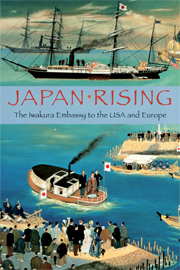Book contents
- Frontmatter
- Contents
- Introduction by Ian Nish
- Note on the Text
- VOLUME I THE UNITED STATES OF AMERICA
- VOLUME II BRITAIN
- 21 A Survey of Britain
- 22 A Survey of London
- 23 A Record of London, 1
- 24 A Record of London, 2
- 25 A Record of London, 3
- 26 A Record of Liverpool, 1
- 27 A Record of Liverpool, 2
- 28 A Record of Manchester, 1
- 29 A Record of Manchester, 2
- 30 A Record of Glasgow
- 31 A Record of Edinburgh
- 32 A Tour of the Highlands
- 33 A Record of Newcastle, 1
- 34 A Record of Newcastle, 2
- 35 A Record of Bradford
- 36 A Record of Sheffield
- 37 A Record of Staffordshire and Warwickshire
- 38 A Record of Birmingham
- 39 A Record of Cheshire
- 40 A Record of London, 4
- VOLUME III CONTINENTAL EUROPE, 1
- VOLUME IV CONTINENTAL EUROPE, 2
- VOLUME V CONTINENTAL EUROPE, 3; AND THE VOYAGE HOME
- Index
38 - A Record of Birmingham
Published online by Cambridge University Press: 04 August 2010
- Frontmatter
- Contents
- Introduction by Ian Nish
- Note on the Text
- VOLUME I THE UNITED STATES OF AMERICA
- VOLUME II BRITAIN
- 21 A Survey of Britain
- 22 A Survey of London
- 23 A Record of London, 1
- 24 A Record of London, 2
- 25 A Record of London, 3
- 26 A Record of Liverpool, 1
- 27 A Record of Liverpool, 2
- 28 A Record of Manchester, 1
- 29 A Record of Manchester, 2
- 30 A Record of Glasgow
- 31 A Record of Edinburgh
- 32 A Tour of the Highlands
- 33 A Record of Newcastle, 1
- 34 A Record of Newcastle, 2
- 35 A Record of Bradford
- 36 A Record of Sheffield
- 37 A Record of Staffordshire and Warwickshire
- 38 A Record of Birmingham
- 39 A Record of Cheshire
- 40 A Record of London, 4
- VOLUME III CONTINENTAL EUROPE, 1
- VOLUME IV CONTINENTAL EUROPE, 2
- VOLUME V CONTINENTAL EUROPE, 3; AND THE VOYAGE HOME
- Index
Summary
November 3rd, 1872. Cloudy.
Today being Sunday, we rested. Birmingham has become the fifth-largest city in the country. It is known throughout Britain for its multitude of factories. There are iron-founders, goldsmiths, silversmiths, coppersmiths, glass-founders and a hundred more, but as we had already had the opportunity to make detailed inspections of factories of all kinds, we passed over most of them and there were a great many places which we did not see.
November 4th. Cloudy; rain in the evening.
We went to the Chance Brothers' works, where glass apparatuses for lighthouses were manufactured. In the shop where the lighthouse lenses were assembled, Mr. Chance himself explained the principle behind the operation, but his explanation went so deeply into the science of optics that even the interpreters could barely understand it.
In Japan, the science of chemistry had its origins in the practice of medicine. As a result, the object of chemistry has been wrongly understood by people in general to be the careful mixing of medicinal compounds in small quantities. This has been a great obstacle to the progress of industry. The Japanese people have experience of, and benefit personally from, one small corner of the science of chemistry, but none knows anything about the foundations on which it rests. The importance of chemistry to industrial progress is like that of water to a man dying of thirst.
- Type
- Chapter
- Information
- Japan RisingThe Iwakura Embassy to the USA and Europe, pp. 196 - 199Publisher: Cambridge University PressPrint publication year: 2009



